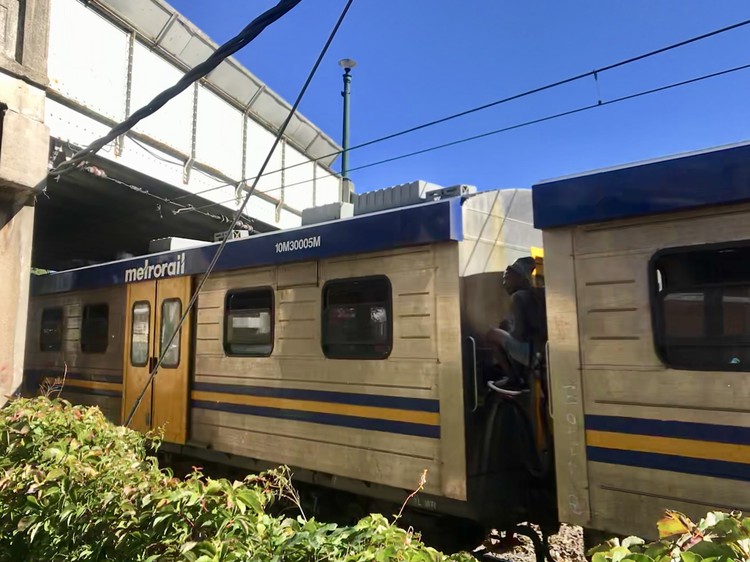
In an unsigned and undated letter to the National Treasury, acting PRASA chief executive Nkosinathi Sishi has asked for permission to source private security for three months from Eskom’s private security list. Photo: Brent Meersman
27 November 2019
In an unsigned and undated letter to the National Treasury, acting PRASA chief executive Nkosinathi Sishi has asked for permission to source private security for three months from Eskom’s private security list.
The leaked letter to Willie Mathebula, the chief procurement officer at National Treasury, requests a deviation from normal bidding processes. Sishi asks Mathebula to consider and approve a request “for a closed competitive bidding process against the contracted supplier list of Eskom” to tide the company over for three months from December until a Treasury contract is finalised. No response was received from PRASA by the time of publication.
Sishi argued in the letter that this move is necessitated by PRASA’s decision to immediately cancel the current security service providers, which had been operating on month-to-month extensions for two years.
These month-to-month contracts were cancelled by PRASA, without replacement, at the end of October, because they were irregular and probably illegal, and because the companies involved had failed to secure PRASA assets.
PRASA’s decision was challenged in the Western Cape High Court by the security companies, with #UniteBehind admitted as a friend of the court. Judge President John Hlophe ruled to reverse the decision, until replacement security could be guaranteed and a commuter-centred safety plan was published by PRASA.
Now PRASA has asked to approach Eskom’s list of contracted security service providers, to engage them in a closed bidding process.
On first inspection, Sishi’s list of Eskom suppliers contains over 70 companies. However, the list is organised by province and many of the security operators listed are repeated.
PRASA’s main operations are centred in three provinces – the Western Cape, KwaZulu-Natal, and Gauteng, with a minor service in the Eastern Cape. Sishi’s Eskom list includes companies for eight provinces; 14 entries for Limpopo, nine for Mpumalanga and North West, and four for the Free State. By contrast, there are only four possible suppliers listed for the Western Cape.
Some of the companies in the list are among those recently fired by PRASA or are party to contracts under investigation as part of the Public Protector’s report and follow-up investigations.
These include Vusa-Isizwe, Intense Protection and Tourist Services, and Sidas.
Vusa-Isizwe was investigated by Strategic Investigations & Seminars at the request of the National Treasury. Between 13 March 2010 and 31 May 2016, Vusa-Isizwe was paid R199.6 million by PRASA. The contract was inherited from Transnet, appointed without competitive bidding, and investigators could not locate the original bid document, a signed contractual agreement or the specification of the work. Vusa-Isizwe also failed to provide the investigators with financial information about work done. The investigators recommended that PRASA institute civil action to recover R27.9 million from Vusa-Isizwe.
No response was received from Vusa-Isizwe by the time of publication.
Intense Protection and Tourist Services was investigated by Nexus and by Werksmans. The company was paid R54 million by PRASA. Nexus made a number of findings against Intense, including that it did not comply with the compulsory tender document requirements; a number of procurement documents on the tender process were missing; some equipment was not distributed to the regions where it was required, and the tender was irregular .
Nexus found that there were sufficient grounds to report the Intense contract to SAPS. When asked for comment, Intense replied that their bid proposal was above board and all equipment was delivered and verified before each payment was made, and that any missing documents were due to PRASA’s document management system.
Sidas was investigated by Werksmans. Concerns about Sidas stretch back to the initial Public Protector investigations into PRASA. On 15 April 2009, Sidas was awarded a monthly contract of R3.7 million without any tender process or competitive quotations. After the Public Protector signalled that she was investigating the matter, PRASA responded by cancelling the Sidas contract. PRASA did not use Sidas again after this.
No response was received from Sidas by the time of publication.
It is unclear why Sishi left the rail system unguarded, and commuters even more vulnerable. Cape Town’s Central Line has been out of service for a month due to “vandalism”, and commuters on lines that do work are at risk daily.